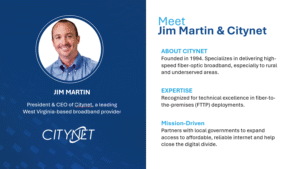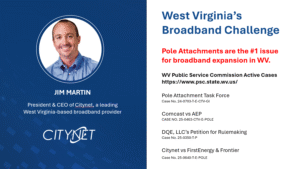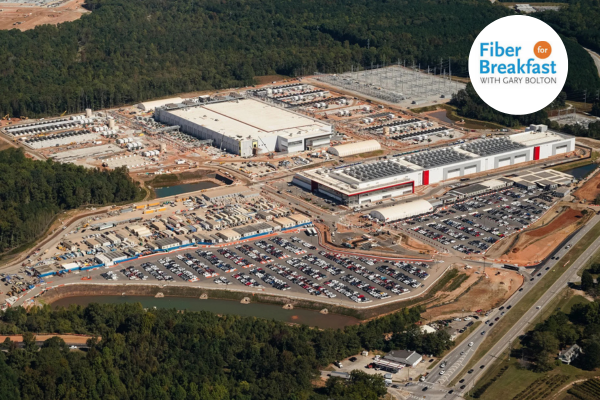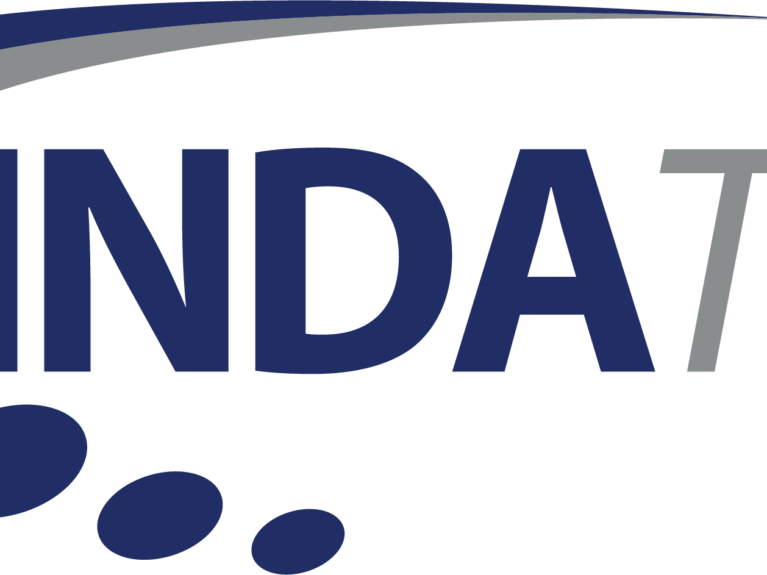FFB Week 31: Bridging the Divide in the Mountain State: Citynet’s Role in Rural Broadband Expansion
FFB Week 31: Bridging the Divide in the Mountain State: Citynet’s Role in Rural Broadband Expansion
Fiber broadband is rapidly expanding across West Virginia, fueled by bold public-private partnerships and significant infrastructure investments. While meaningful progress has been made, many communities remain underserved or entirely unserved—underscoring the continued need for strategic broadband deployment. On this episode of Fiber for Breakfast, Jim Martin, President and CEO of Citynet, talks with Gary Bolton, President and CEO of the Fiber Broadband Association and shared some of the major challenges Citynet and other Internet Service Providers (ISPs) are faced with and how bold partnerships and targeted investments are transforming rural connectivity in West Virginia.

Building a Backbone in Rural America Citynet’s roots trace back to 2001, starting as a dial-up and web development company. The game-changer came in 2004 when the company became a CLEC and began acquiring assets—including distressed fiber infrastructure from Adelphia Business Solutions and America’s Fiber Network (AFN), which added 9,000 miles of middle-mile fiber across 13 states. That experience sharpened Citynet’s focus on the middle mile, a persistent challenge in rural broadband deployment.
After selling AFN to Zayo, Citynet refocused entirely on West Virginia—where terrain, legacy infrastructure, and market fragmentation present both obstacles and opportunities.
Vertical Integration as a Strategic Advantage What sets Citynet apart is its end-to-end operational model. The company owns and operates everything in-house—from its 24/7 call center in Bridgeport, WV, to engineering, permitting, and construction. That structure proved invaluable during COVID-19, when supply chains were strained and labor was hard to source. “We didn’t want to risk our name by relying on contractors,” Martin explained. Taking on these internal controls allows Citynet to be agile and responsive, especially in rural areas where timelines and logistics are far more complex than urban builds.
Public-Private Partnerships: A Proven Model Citynet is a vocal proponent of public-private partnerships (PPPs). Its first fiber-to-the-home project launched in 2015 with the City of Bridgeport. The city funded the build, while Citynet engineered and deployed fiber to every home—later acquiring the network asset.
This replicable model has been used across the state with county commissions, economic development authorities, and state and federal partners (Connect America Fund, USDA’s ReConnect, etc.). The public initiative retains control during deployment, ensuring accountability, while Citynet later assumes ownership to handle long-term maintenance.
One of Citynet’s newest projects, in Nicholas County, was made possible through local leadership and USDA engagement.

Regulatory Bottlenecks: Pole Attachments in West Virginia Despite successes, Citynet—and many other providers—face significant regulatory hurdles, particularly around pole attachments. In West Virginia, aerial deployment is used in roughly 95% of builds due to rocky terrain and high underground build costs. Most poles are jointly owned by FirstEnergy and Frontier, a Citynet competitor.
“We’re often required to fix decades-old violations from other providers—at our expense—just to gain access to poles even though the FCC has made it crystal clear that new attachers should not be held accountable for errors in the past,” Martin said.
Citynet has filed formal complaints, and the West Virginia Public Service Commission (PSC) has recently responded with new rules enabling temporary attachments and rulings in favor of competitive providers. Still, delays in make-ready work and disputes over who pays for past errors remain a critical issue.
BEAD Funding and the Path Forward West Virginia was allocated $1.2 billion in BEAD funding, and the state has already mapped over 200,000 unserved or underserved homes. About half are being addressed through existing projects, but BEAD or other funding resources will be essential for the rest.
Working closely with the state broadband office, Citynet and other providers were required to identify high-cost locations that may be served better by alternative technologies, rather than traditional fiber. Still, Martin emphasized fiber must remain the backbone for future economic development. He goes on to mention that in those rural areas, it’s remarkable when they go out to serve these customers. They are literally still working off copper landlines – which means communication but there is no cellular. Martin explains that more fiber is needed in those rural areas. “It’s going to allow for more cell towers to be put up, which then provides another means of connectivity.”
A Model for Other States Citynet’s experience illustrates what’s possible when local leadership, industry expertise, and policy align. From vertically integrated operations to scalable PPPs, their model offers a blueprint for other rural regions facing similar challenges. Jim ended the podcast with a final thoughts – “I love competition. I think competition is the greatest thing that could ever happen in business, because it holds everybody to account, right? It makes sure that you deliver a better product and a good service. Otherwise, you’re going to switch and so we’ll have to wait and see how it plays out, but I’m very hopeful that our state’s going to be
successful in petitioning to allow us to use a good chunk of our BEAD money to build while at the same time recognizing these high-cost areas.”
Click here to listen to the full episode or find previous episodes of Fiber for Breakfast.
Click here to download the slides used in this episode.




